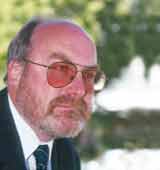|
Executive Interviews: Interview with David J Snowden on Decision Making
May 2008
-
By Dr. Nagendra V Chowdary
 David J Snowden
David J Snowden Adjunct Professor of Knowledge Management at the University of Canberra. 
Can you tell us about Cognitive
Edge? What is the scope of its
activities?
CE really has three purposes. 'Firstly
we are creating an open source
approach to consultancy. Our
methods can be downloaded from
the website (subject to a creative
commons license) without cost.
Secondly, we are experimenting with
new approaches to research in social
systems. Thirdly, we have developed
the Sense Maker software suite, to
support that research and the
network. Applications include
knowledge management, quantitative
approaches to what has previously
been qualitative research,weak signal
detection, strategy and other areas.
|
|
-
What is the relationship, if any,
between the cognition and decisionmaking?
Cognitition is decision-making. The
way we see the world influences
how we act in it. -
Is decision-making a science or
an art? If it is to believed as science,
can its principles be applied
universally? If it is an art, how can
someone be trained to be an effective
decision-maker?
It is a mixture of science and
experience and to a degree art.We can
produce powerful tools to support
decision-makers, but experience
remains critical to the more complex
issues. Training can help. -
JimCollins, in an article in Fortune
(June 27, 2005) distinguished between
bad decisions and wrong decisions.
What according to you is the
distinction between bad decisions
and wrong decisions? What have
been the 10 most-important-ever
corporate decisions made, according
to you?
This is a classic context free
statement. There are various types of
decision. For example, I may want to
make a series of small contradictory
decisions and initiative a set of
recoverable actions to see what is
possible in a space. If I can know the
outcome then the statement is valid. If
the outcome is not predictable then
we need to think differently. Moving
from a fail-safe approach to making
the right decision, to a safe-fail
experimental approach. In this
context, the question of right and
wrong is meaningless. -
How do you describe an effective
(good) decision? Who according to
you would be the best-ever decisionmakers
in corporate history? What
traits did they exhibit?
I consider this question, and the
assumptions behind it dangerous.
Decisions are contextual and decision
makers in one contextmay be good in
another bad. There are no universal
traits that underpin decision-making.
The most one can say is that good
leaders are aware of the context and
make (or enable) contextual decisions
to be made. -
In your article ('A Leader's
Framework for Decision-Making",
HBR, November 2007), you have
observed that, not all leaders achieve
the desired results when they face
situations that require a variety of
decisions and responses. Why?
Because in part they have been
trained by people who ask questions
like the previous one. They don't
understand experimentation of safefail
decision processes. They also
think they have to make all the
decisions, when often the decision
process can be moved to smaller
decisions made by more people
which lead to a manageable
evolutionary process. -
What is the traditional approach to
leadership and decision-making?
Why do you argue for a new
perspective (on decision-making)
based on complexity science?What is
the relationship between complexity
science and decision-making? Why is
an understanding of complexity so
important for better decision-making?
Because traditional leadership
models assume that there is a
knowable right answer. Complexity
Science shows us a range of systems
where there are no right answers,
only possibilities so our theory of
leadership and decision-making has
to change to accommodate this. †Complexity is more a way of
thinking about the world that a new
way of working with mathematical
models. Over a century ago, Fredrick
Winslow Taylor, the father of
scientific management,
revolutionized leadership. Today,
advances in complexity sciences,
combined with knowledge from the
cognitive sciences, are transforming
the field once again, complexity is
poised to help the current and future
leaders make sense of advanced
technology, globalization, intricate
markets, cultural change, and much
more. In short, the science of
complexity can help all of us address
the challenges and opportunities we
face in a new epoch of human history.† -
What is Cynefin framework?
What are its components? Why
contexts assume greater importance
in your framework?
†Over the past ten years, we have
applied the principles of that science
to government and a broad range of
industries. Working with other
contributors, we developed the
Cynefin framework, which allows
the executives to see things from new viewpoints, assimilate complex
concepts, and address real-world
problems and opportunities.
(Cynefin, pronounced Ku-nev-in, is a
Welsh word that signifies the
multiple factors in our environment
and our experiences that influence us
in ways we can never understand.)
Using this approach, leaders learn to
define the framework
with examples from their own
organization's history and scenario of
its possible future. This enhances
communication and helps executives
rapidly understand the context in
which they are operating. The framework sorts the issues facing
leaders into five contexts defined by
the nature of the relationship between
cause and effect. Four of these
simple, complicated, complex and
chaotic require leaders to diagnose
situations and to act in contextually
appropriate ways. The fifth
disorder applies when it is unclear
which of the other four contexts is
predominant.
1.
Decision Making Case Study
2. ICMR
Case Collection
3.
Case Study Volumes
|
